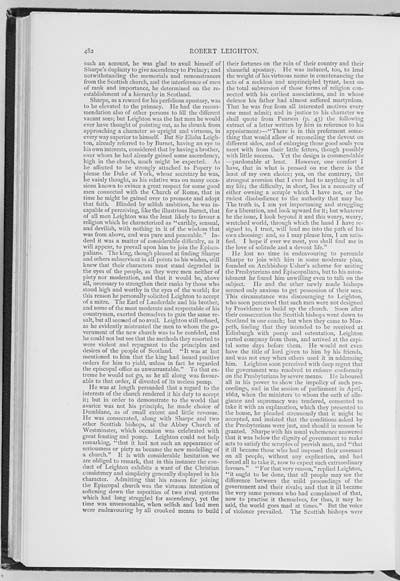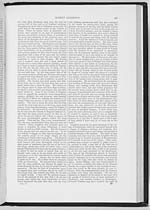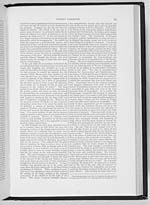482
such an account, he was glad to avail himself of
Sharpe's duplicity to give ascendency to Prelacy; and
notwithstanding the memorials and remonstrances
from the Scottish church, and the interference of men
of rank and importance, he determined on the re-
establishment of a hierarchy in Scotland.
Sharpe, as a reward for his perfidious apostasy, was
to be elevated to the primacy. He had the recom-
mendation also of other persons to fill the different
vacant sees; but Leighton was the last man he would
ever have thought of pointing out, as he shrunk from
approaching a character so upright and virtuous, in
every way superior to himself. But Sir Elisha Leigh-
ton, already referred to by Burnet, having an eye to
his own interests, considered that by having a brother,
over whom he had already gained some ascendency,
high in the- church, much might be expected. As
he affected to be strongly attached to Popery to
please the Duke of York, whose secretary he was,
he vainly thought, as his relative was on many occa-
sions known to evince a great respect for some good
men connected with the Church of Rome, that in
time he might be gained over to promote and adopt
that faith. Blinded by selfish ambition, he was in-
capable of perceiving, like the illustrious Burnet, that
of all men Leighton was the least likely to favour a
religion which he characterized as "earthly, sensual,
and devilish, with nothing in it of the wisdom that
was from above, and was pure and peaceable." In-
deed it was a matter of considerable difficulty, as it
will appear, to prevail upon him to join the Episco-
palians. The king, though pleased at finding Sharpe
and others subservient in all points to his wishes, still
knew that their characters must stand degraded in
the eyes of the people, as they were men neither of
piety nor moderation, and that it would be, above
all, necessary to strengthen their ranks by those who
stood high and worthy in the eyes of the world; for
this reason he personally solicited Leighton to accept
of a mitre. The Earl of Lauderdale and his brother,
and some of the most moderate and respectable of his
countrymen, exerted themselves to gain the same re-
sult, but all seemed of no avail. Leighton still refused,
as he evidently mistrusted the men to whom the go-
vernment of the new church was to be confided, and
he could not but see that the methods they resorted to
were violent and repugnant to the principles and
desires of the people of Scotland. "It was at last
mentioned to him that the king had issued positive
orders for him to yield, unless in fact he regarded
the episcopal office as unwarrantable." To that ex-
treme he would not go, as he all along was favour-
able to that order, if divested of its useless pomp.
He was at length persuaded that a regard to the
interests of the church rendered it his duty to accept
it; but in order to demonstrate to the world that
avarice was not his principle, he made choice of
Dumblane, as of small extent and little revenue.
He was consecrated, along with Sharpe and two
other Scottish bishops, at the Abbey Church of
Westminster, which occasion was celebrated with
great feasting and pomp. Leighton could not help
remarking, "that it had not such an appearance of
seriousness or piety as became the new modelling of
a church." It is with considerable hesitation we
are obliged to remark, that in this instance the con-
duct of Leighton exhibits a want of the Christian
consistency and simplicity generally displayed in his
character. Admitting that his reason for joining
the Episcopal church was the virtuous intention of
softening down the asperities of two rival systems
which had long struggled for ascendency, yet the
time was unseasonable, when selfish and bad men
were endeavouring by all crooked means to build
their fortunes on the ruin of their country and their
shameful apostasy. He was induced, too, to lend
the weight of his virtuous name in countenancing the
acts of a reckless and unprincipled tyrant, bent on
the total subversion of those forms of religion con-
nected with his earliest associations, and in whose
defence his father had almost suffered martyrdom.
That he was free from all interested motives every
one must admit; and in justice to his character we
shall quote from Pearson (p. 43) the following
extract of a letter written by him in reference to his
appointment:�"There is in this preferment some-
thing that would allow of reconciling the devout on
different sides, and of enlarging those good souls you
meet with from their little fetters, though possibly
with little success. Yet the design is commendable
�pardonable at least. However, one comfort I
have, that in what is pressed on me there is the
least of my own choice; yea, on the contrary, the
strongest aversion that I ever had to anything in all
my life; the difficulty, in short, lies in a necessity of
either owning a scruple which I have not, or the
rudest disobedience to the authority that may be.
The truth is, I am yet importuning and struggling
for a liberation, and look upward for it; but whatever
be the issue, I look beyond it and this weary, weary,
wretched world, through which the hand I have re-
signed to, I trust, will lead me into the path of his
own choosing: and, so I may please him, I am satis-
fied. I hope if ever we meet, you shall find me in
the love of solitude and a devout life."
He lost no time in endeavouring to persuade
Sharpe to join with him in some moderate plan,
founded on Archbishop Usher's scheme for uniting
the Presbyterians and Episcopalians, but to his aston-
ishment he found him unwilling even to talk on the
subject. He and the other newly made bishops
seemed only anxious to get possession of their sees.
This circumstance was discouraging to Leighton,
who soon perceived that such men were not designed
by Providence to build up the church. Soon after
their consecration the Scottish bishops went down to
Scotland in one coach; but when they came to Mor-
peth, finding that they intended to be received at
Edinburgh with pomp and ostentation, Leighton
parted company from them, and arrived at the capi-
tal some days before them. He would not even
have the title of lord given to him by his friends,
and was not easy when others used it in addressing
him. Leighton soon perceived with deep regret that
the government was resolved to enforce conformity
on the Presbyterians by severe means. He laboured
all in his power to show the impolicy of such pro-
ceedings, and in the session of parliament in April,
1662, when the ministers to whom the oath of alle-
giance and supremacy was tendered, consented to
take it with an explanation, which they presented to
the house, he pleaded strenuously that it might be
accepted, and insisted that the conditions asked by
the Presbyterians were just, and should in reason be
granted. Sharpe with his usual vehemence answered
that it was below the dignity of government to make
acts to satisfy the scruples of peevish men, and "that
it ill became those who had imposed their covenant
on all people, without any explication, and had
forced all to take it, now to expect such extraordinary
favours." " For that very reason," replied Leighton,
"it ought to be done, that all people may see the
difference between the mild proceedings of the
government and their rivals; and that it ill became
the very same persons who had complained of that,
now to practise it themselves, for thus, it may be
said, the world goes mad at times." But the voice
of violence prevailed. The Scottish bishops were

![]() Universal Viewer |
Universal Viewer | ![]() Mirador |
Large image | Transcription
Mirador |
Large image | Transcription
![]()

